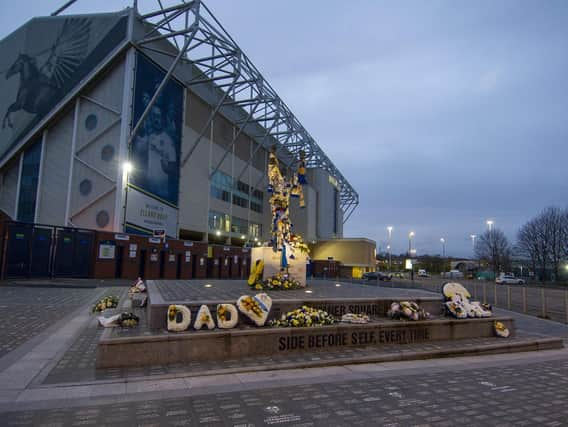The changing face of Leeds United supporters as coronavirus pandemic worsens - Daniel Chapman


Our faces look different from a couple of weeks ago. They’re further away, first of all, either at a distance of two metres, or through a window or a webcam; some are half-covered by masks.
And our expressions have changed. Two weeks ago the spread of coronavirus was answered with half-amused glances, side-eyes and eye-rolls, eyebrows cocking at rumours of postponements. Calling off the season weeks short of deciding our long-awaited promotion was ‘Typical Leeds’, and our faces were rueful and bitter.
Advertisement
Hide AdAdvertisement
Hide AdHad the game against Cardiff City gone ahead, I imagine many of our faces flushed with beer in the away end, mouths opening wide to expel air from strong lungs across healthy vocal chords, making unprintable suggestions of what the Football League could go away and do.
That’s gone. Any defiance the mirror now shows is masking wide-eyed fear, as I think less often of the Peacocks’ promotion and more of the fates of my family and friends and Leeds fans and citizens.
The death tolls from Italy are of a scale that can be mapped onto blocks of seating at Elland Road. The lower tier of the Cheese Wedge, say, gone in a day. I can’t roll my eyes at that and wonder why Leeds aren’t going up or the pubs aren’t opening.
The faces becoming more visible are those of tired, frustrated, frightened and ill NHS workers, pleading across social media for people to stay at home, to help. They look like you and me but their faces are dreadfully different to the ones in our mirrors, for which we lucky ones stuck indoors should be grateful. That gratitude is best expressed by listening to what they are saying.
Advertisement
Hide AdAdvertisement
Hide AdThe notion of this virus being ‘typically Leeds’ seems absurd now that we can appreciate its global impacts in our increasingly local lives. But meanwhile these are the sports pages, where we write seriously about daft games, somewhere absurdity can continue.
This stalled season is unlike any other, but the football club we support is unlike any other, and has its roots in seasons like this, spent unexpectedly idle. Leeds City played eight games of the 1919/20 season before the Football League banished them, forcing the foundation of Leeds United. But that’s a story for another day.
Less well known is that Leeds City were themselves born from a club on pause. The popular version dates City to a meeting at The Griffin Hotel on Boar Lane on August 29, 1904, and their first match away to Morley three days later.
The real story goes back further, to 1889, and a team founded at Leeds Steelworks. Hunslet AFC were known as The Twinklers for the way kish dust from steelworking made their players shimmer, and they were the best club West Yorkshire football had yet known.
Advertisement
Hide AdAdvertisement
Hide AdThey won the first soccer game ever played at Elland Road, beating Harrogate in 1898 to win their second West Yorkshire Cup.
Hunslet’s own home was everywhere and nowhere. All they needed for entry to the Football League was a proper ground to call their own, but with two codes of rugby and ever more soccer clubs playing in the city, Hunslet somehow missed out on dibs.
At the start of 1902/03 The Twinklers announced their team for the season opener away at Dewsbury Celtic, with a plea: they had nowhere to play their home games. With no help forthcoming, the game at Dewsbury was hurriedly called off, and headlines announced: ‘The Hunslet Club Defunct’.
Well, not quite. The players transferred elsewhere but promised to return. The committee planned fundraisers to keep the club afloat, without team or pitch. Club secretary Fred W Waterhouse, the city’s tireless chief ‘sockerist’, planned a revival.
Advertisement
Hide AdAdvertisement
Hide AdThe view in the newspapers was that, with its best team gone, the city of Leeds would now probably never have a professional soccer club in the Football League: Bradford City won that contest in West Yorkshire. But as football carried on around him, Waterhouse didn’t give up.
Through May and June 1904, two months before the famous meeting at The Griffin, the Hunslet club was resurrected at The Royal Exchange Hotel, with a new name: Leeds City Association Club. After two seasons without kicking a ball, The Twinklers were coming back.
We often look to history to illuminate our football clubs, to establish a character, claim inherent DNA, elevate current events above the ordinary to ‘Typical Leeds’. If that’s true, it’s not the virus that’s typical of our club’s fortunes, but this present stillness at Elland Road, the pause that is battering our spirits and casting our faces down. Leeds are a different football club, because we don’t need football. Right now we can use that energy elsewhere.
Comment Guidelines
National World encourages reader discussion on our stories. User feedback, insights and back-and-forth exchanges add a rich layer of context to reporting. Please review our Community Guidelines before commenting.